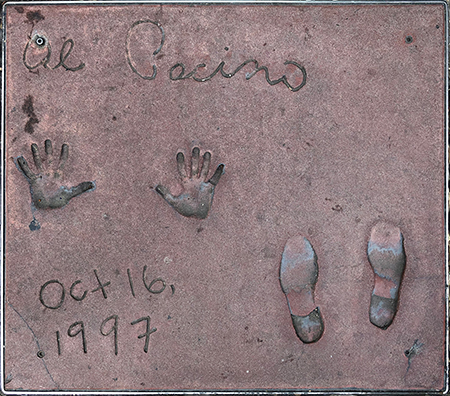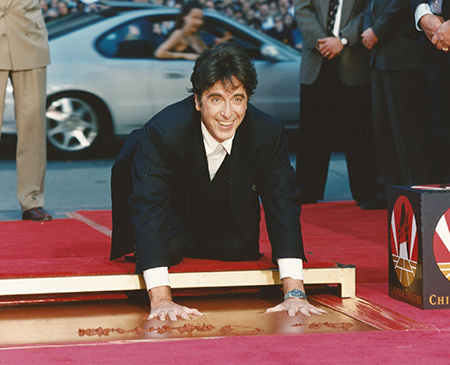 |
 |
|
|
| Al Pacino |
 |
| Forecourt Ceremony held on Thursday, October 16, 1997 |
| |
Born: April 25, 1940, in New York City, New York
Age at the time of the ceremony: 57
|
| |
Al Pacino is the intense New York-based actor, plucked from obscurity to star in The Godfather, and has been a consistently watchable performer, almost always in films which might not have gotten anywhere without his involvement.
You may not believe this, but Al Pacino's mother Kate's parents emmigrated from Corleone Sicily.
Pacino's parents divorced when he was only two. He grew up with his mother and her parents in The Bronx. Wanting to be an actor or a baseball player, Pacino was a handful in high school. He dropped out, left home, and worked odd jobs while attending acting classes with Charlie Laughton.
This hardscrabble condition worsened in 1962, when his mother and grandfather both died. After applying several times, Pacino was accepted into the Actor's Studio, where he was taught "the method" by Lee Strasberg. Pacino excelled
as Ralph in a production of Clifford Odets' Awake and Sing! in Boston in 1967. After winning an Obie Award for appearing in Isreal Horovitz's The Indian Wants the Bronx, agent Martin Bregman became Pacino's manager.
After appearing on the television show
N.Y.P.D. aired over ABC in November 1968, Pacino made his Broadway debut in Don Petersen's Does a Tiger Wear a Necktie?, winning a Tony Award for supporting actor. After doing a small role in Me, Natalie (released in July 1969) with Patty Duke, director Jerry Schatzberg hired Pacino for the lead in The Panic in Neddle Park (premiered in May 1971 at the Cannes Film Festival) with Kitty Winn. Director Francis Ford Coppola saw the play, but was not able to cast Pacino in his upcoming film until the last minute.
The Godfather (released in March 1972) with, you know, Marlon Brando, instantly made Pacino a star of the highest rank. He then appeared in Jerry Schatzberg's Scarecrow (released in April 1973) with Gene Hackman. The film won the top prize at Cannes, but flopped in the US. Working quickly, Pacino dazzled the world with his performance in Serpico (released in December 1973), then starred in the sequel which launched a thousand sequels, The Godfather: Part II (released in December 1974).
Now came the flood of Pacino starring roles:
Dog Day Afternoon (released in December 1975) with John Cazale, . . . and justice for all (released in October 1979) with Jack Warden, Cruising (released in February 1980), Scarface (released in December 1983) with Michelle Pfeiffer, Revolution (released in December 1985) with Donald Sutherland, Sea of Love (released in September 1989) with Ellen Barkin, and Dick Tracy (released in June 1990) with Warren Beatty.
Paramount greenmailed Pacino into appearing in
The Godfather: Part III (which played the Chinese in December 1990) with Diane Keaton, then did the smallish Frankie and Johnny (which played the Chinese in October 1991) with Michelle Pfeiffer. He was in the ensemble cast of Glengarry Glen Ross (released in October 1992) with Jack Lemmon.
Pacino's turn as a blind cupid who explaines things to a younger man,
Scent of a Woman (released in December 1992) with Chris O'Donnell, finally brought Pacino an Oscar for Best Actor. Heat (which played the Chinese in December 1995) with Robert De Niro, became another in a long list of Pacino efforts having to do with the underworld.
While staging Shakespeare's Richard III in New York, Pacino filmed the process of putting the play together, creating the documentary Looking for Richard (released in October 1996) with Alec Baldwin. Pacino returned to the crime film in Donnie Brasco (released in February 1997) with Johnny Depp, and The Devil's Advocate (which played the Chinese in October 1997) with Keanu Reeves.
He played a television reporter in
The Insider (released in November 1999) with Russell Crowe, a football team owner in Any Given Sunday (which played the Chinese in December 1999), and a police detective in Insomnia (released in May 2002) with Robin Williams.
Pacino is a major prescence as a dying Roy Cohn in
Angels in America aired over HBO in December 2003, then played a professional gambler showing the new guy the ropes in Two for the Money (which played the Chinese in October 2005) with Matthew McConaughey. He then played the bad guy in Ocean's Thirteen (which played the Chinese in June 2007) with George Clooney.
Switching gears, Pacino played a couple of real-life characters in television movies: Jack
Kevorkian in You Don't Know Jack aired over HBO in April 2010 with Brenda Vaccaro, and record producer Phil Spector airing over HBO in March 2013 with Helen Mirren.
Pacino starred as King Herod and directed a film of Oscar Wilde's play Salomé (released in August 2014) with Jessica Chastain, and also made a documentary on the production of the film, Wilde Salomé (released in April 2017). His small film as cat-loving Manglehorn (premiered in August 2014 at the Venice Film Festival) with Holly Hunter, was followed by The Pirates of Somalia (released in December 2017) with Evan Peters. Paterno aired over HBO in April 2018.
Pacino got a small part in Once Upon a Time in Hollywood (which played the Chinese in August 2019), and played Jimmy Hoffa for director Martin Scorsese in The Irishman (released in November 2019) with Robert De Niro. Pacino has a role in ten episodes of Hunters with Lena Olin, streaming over Amazon Prime in February 2020.
Pacino plays Aldo Gucci in director Ridley Scott's House of Gucci (released in November 2021). Pacino released his autobiography Sonny Boy in October 2024. |
|
|
|
|
| |
 |
 |
| Mann's Chinese Theatre, Hollywood, California. Al Pacino Forecourt block. Executed by unknown, Thursday, October 16, 1997. 50 x43 inches. |
 |
 |
 |
| Mann's Chinese Theatre, Hollywood, California. Al Pacino Forecourt ceremony, Thursday, October 16, 1997. Al Pacino flashes a smile while placing his hands into the cement. |
|
|